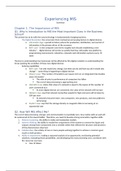Experiencing MIS
Summary
Chapter 1. The Importance of MIS
Q1. Why Is Introduction to MIS the Most Important Class in the Business
School?
The answer has to do with the way technology is fundamentally changing business:
- The Digital Revoluton: the conversion from mechanical and analog devices to digital devices.
o Informaton Age: a period in history where the producton, distributon, and control of
informaton is the primary driver of the economy
o Bell’s Law: “a new computer class forms roughly each decade establishing a new
industry” – digital devices will evolve so quickly that they will enable new platorms,
programming environments, industries, networks and informaton systems every 10
years
The key to understanding how businesses will be afected by this digital evoluton is understanding the
forces pushing the evoluton of these new digital devices:
- Evolving capabilites
o Bell’s Law: “not only would you change, but what you do and how you do it would also
change” – same thing is happening to digital devices
o Moore’s Law: “The number of transitons per square inch on an integrated chip doubles
every 18 months”
The rato of price to performance of computers has fallen
The cost of data processing is approaching zero
o Metcalfe’s Law: states that value of a network is equal to the square of the number of
users connected to it
As more digital devices are connected, the value of the network will increase
o Nielsen’s Law: says that network connecton speeds for high-end users will increase by
50% per year
As networks become faster, new companies, new products, and new platorms
will emerge
o Kryder’s Law: says that the storage density on magnetc disks is increasing at an
exponental rate
Q2. How Will MIS Afect Me?
The cost of data processing, storage, and communicaton is essentally zero. Any routne skill can and will
be outsourced to the lowest bidder. Therefore, you need to develop strong nonroutne cognitve skills:
1. Abstract reasoning: the ability to make and manipulate models.
2. Systems thinking: the ability to model the components of the system to connect the inputs and
outputs among those components into a sensible whole that refects the structure and dynamics
of the phenomenon observed.
3. Collaboraton: the actvity of two or more people working together to achieve a common goal,
result or work product.
4. Ability to experiment: making a reasoned analysis of an opportunity, envisioning potental
solutons, evaluatng those possibilites, and developing the most promising ones, consistent with
the resources you have.
o Fear of failure
,Q3. Why Are MIS-related Jobs in High Demand?
Computer systems design and related services had the strongest growth of any job type. Growth rates of
all informaton systems related jobs are above the 11% average for the years 2012 tot 2022. Informaton
systems and computer technology provide job wage benefts beyond just IS professionals.
Tradable job: a job that is not dependent on a partcular locaton.
Q4. What Is MIS?
Management informaton systems (MIS): the management and use of informaton systems that help
organizatons achieve their strategies.
- Informaton system (IS): an assembly of hardware, sofware, data, procedures, and people that
produces informaton
- Informaton technology (IT): refers to the products, methods, inventons, and standards used for
the purpose of producing informaton
Informaton technology drives the development of new informaton systems.
For any new system, you will always have training tasks (and costs), you will always have the need to
overcome employees’ resistance to change, and you always need to manage the employees as they use
the new system. Once your new informaton system is up and running, it must be managed and used
efectvely in order to achieve the organizaton’s overall strategy.
The defniton of MIS has three key elements:
1. Components of an informaton system
o System: a group of components that interact to achieve some purpose.
o Five-component framework: a model of the components of an informaton system.
Computer hardware
Sofware
Data
Procedures
People
2. Management and use of informaton systems
o Management: develop, maintain, and adapt informaton systems.
o Use responsibilites for protectng the security of the system and its data, backing up
data, tasks to perform while the system is down as well as tasks to accomplish to help
recover the system correctly and quickly
3. Achieving strategies
o Informaton systems exist to help people who work in an organizaton to achieve the
strategies of that business
Q5. What Is Your Role in IS Security?
Informaton systems create value, but they also create risk. Every security system ultmately depends on
the behavior of its users. Almost all security systems use usernames and passwords. A strong password
has the following characteristcs:
- Has 10 or more characters, 12 is even beter
- Does not contain your username, real name, or company name
- Does not contain a complete dictonary word in any language
- Is diferent from previous passwords you have used
- Contains both upper- and lowercase leters, numbers, and special characters
One technique for creatng memorable, strong passwords is to base them on the frst leter of the words
in a phrase. Never write down your password, and do not share it with others. Never ask others for their
passwords, and never give your password to someone else. The litle “do-si-do” move – one person
getting out of the way so that another person can enter a password – is common and accepted.
, Reasons introducton to MIS is the most important course in the business school today:
1. Future business professionals need to be able to assess, evaluate, and apply emerging
informaton technology to business.
2. It can give you the ultmate in job security – marketable skills – by helping you learn abstracton,
systems thinking, collaboraton, and experimentaton.
3. Many well-paid MIS-related jobs are in high demand.
Ethics Guide
The German philosopher Immanuel Kant defned the categorical imperatve as the principle that one
should behave only in a way that one would want the behavior to be universal law.
Kant defned duty as the necessity to act in accordance with the categorical imperatve.
- Perfect duty: behavior that must always be met.
- Imperfect duty: acton that is praiseworthy but not required according to the categorical
imperatve (e.g. giving to charity).
Business professionals have an imperfect duty to obtain the skills necessary to accomplish their jobs and
we have an imperfect duty to contnue to develop our business skills and abilites throughout our careers.






